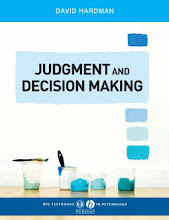How much would you pay for a $50 gift certificate for Barnes and Noble (US bookstore)? How much for a £100 gift certificate? And what would you pay to take part in a lottery where there was a 50/50 chance of winning one or other gift certificate? In earlier research, Gneezy, List, and Wu (2006) found that people were willing to pay an average of $26 for the $50 gift certificate, but those who were presented with the lottery prospect were only willing to pay $16 - despite the fact that the lottery is actually a better prospect than the $50 gift certificate. They found similar results for other single vs lottery prospects, an effect they referred to as the uncertainty effect.
Simohnson (2009) has suggested that the uncertainty effect reflects direct risk aversion. Theories of decisions under risk, such as expected utility theory and prospect theory, assume that utility does not increase linearly with value; rather, successive marginal increases in value evoke smaller increases in utility. However, the uncertainty effect cannot be explained by decreasing marginal utility. Simohnson suggests that people may simply not like uncertainty, and that the mere presence of uncertainty leads people to devalue the available options, i.e. direct risk aversion.
However, one potential problem with the earlier research was that people in the lottery condition got to see both outcomes, whereas those who were asked to value the smaller outcome were not also asked to value the larger outcome (or even shown it). It could be that people devalue the smaller outcome when they see it in the context of the larger outcome. Therefore, Simohnson repeated the earlier research, but asked those in the non-lottery condition to value both the smaller and the larger outcome. He also clarified a potential problem with the wording of the probabilities in the earlier study. As previously, participants attached less value to the lotteries than to the smallest individual outcome within each lottery. An analysis of responses to comprehension questions also indicated that the results could not be explained by a failure to understand the problems.
In short, these results provide evidence that direct risk aversion leads people to value prospects below the value of their worst outcome.
References
Gneezy, U., List, J.A., & Wu, G. (2006). The uncertainty effect: When a risky prospect is valued less than its worst outcome. Quarterly Journal of Economics, 121, 1283–1309
Simonsohn, U. (2009). Direct risk aversion: Evidence from risky prospects valued below their worst outcome. Psychological Science, 20 (6), 686-692.
Saturday, 13 June 2009
Subscribe to:
Post Comments (Atom)
About Google Analytics
This website uses Google Analytics, a web analytics service provided by Google, Inc. (“Google”). Google Analytics uses “cookies”, which are text files placed on your computer, to help the website analyze how users use the site. The information generated by the cookie about your use of the website (including your IP address) will be transmitted to and stored by Google on servers in the United States . Google will use this information for the purpose of evaluating your use of the website, compiling reports on website activity for website operators and providing other services relating to website activity and internet usage. Google may also transfer this information to third parties where required to do so by law, or where such third parties process the information on Google's behalf. Google will not associate your IP address with any other data held by Google. You may refuse the use of cookies by selecting the appropriate settings on your browser, however please note that if you do this you may not be able to use the full functionality of this website. By using this website, you consent to the processing of data about you by Google in the manner and for the purposes set out above.




1 comment:
This is an interesting pair of experiments, but I notice that they only asked their subjects to value the two gift tokens individually, or the lottery, but never both.
If a person was asked to value each gift total and also the lottery it seems to me likely that they would often notice any inconsistency in their values and make an adjustment.
I don't think it is quite right for the experimenters to say that people have an aversion to uncertainty if, given the chance to see the whole picture and provide more rational answers, most people would make a correction.
It also makes a difference whether the uncertainty in a lottery has any practical impact. Sometimes, in life, knowing outcomes in advance enables us to prepare that increases the value of that outcome. In other situations there's nothing we can do differently so certainty/uncertainty has no practical impact.
Has this been studied by psychologists yet?
Post a Comment